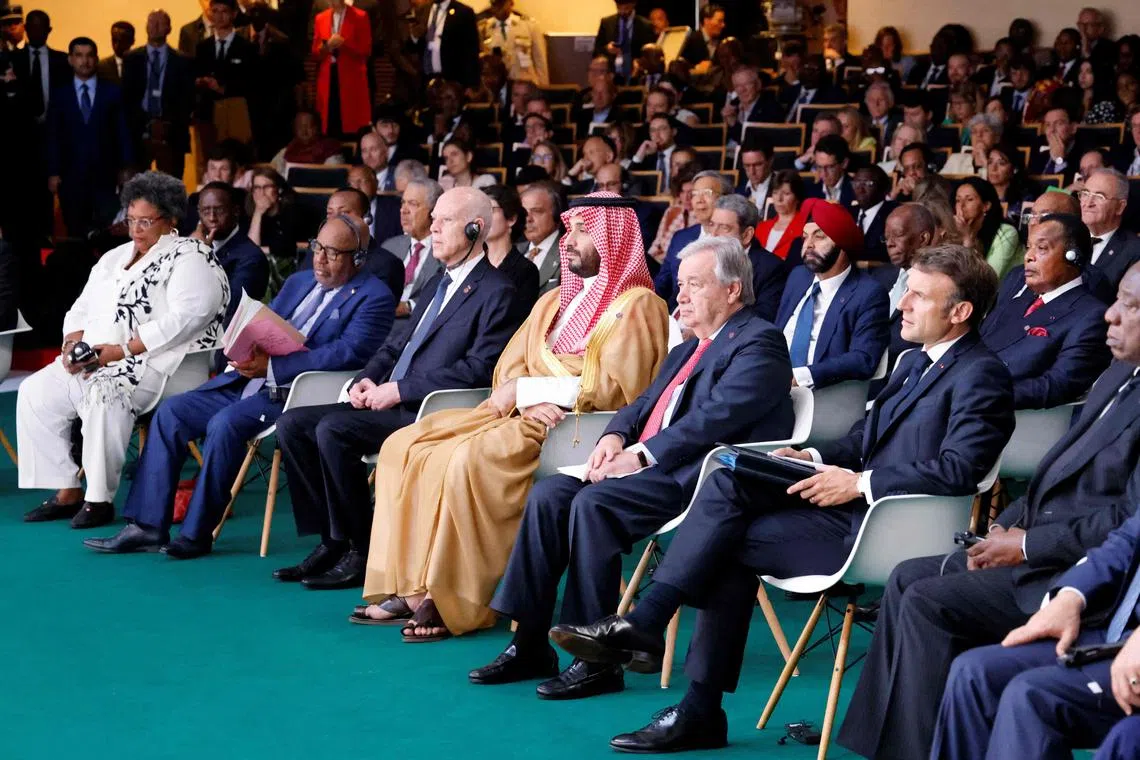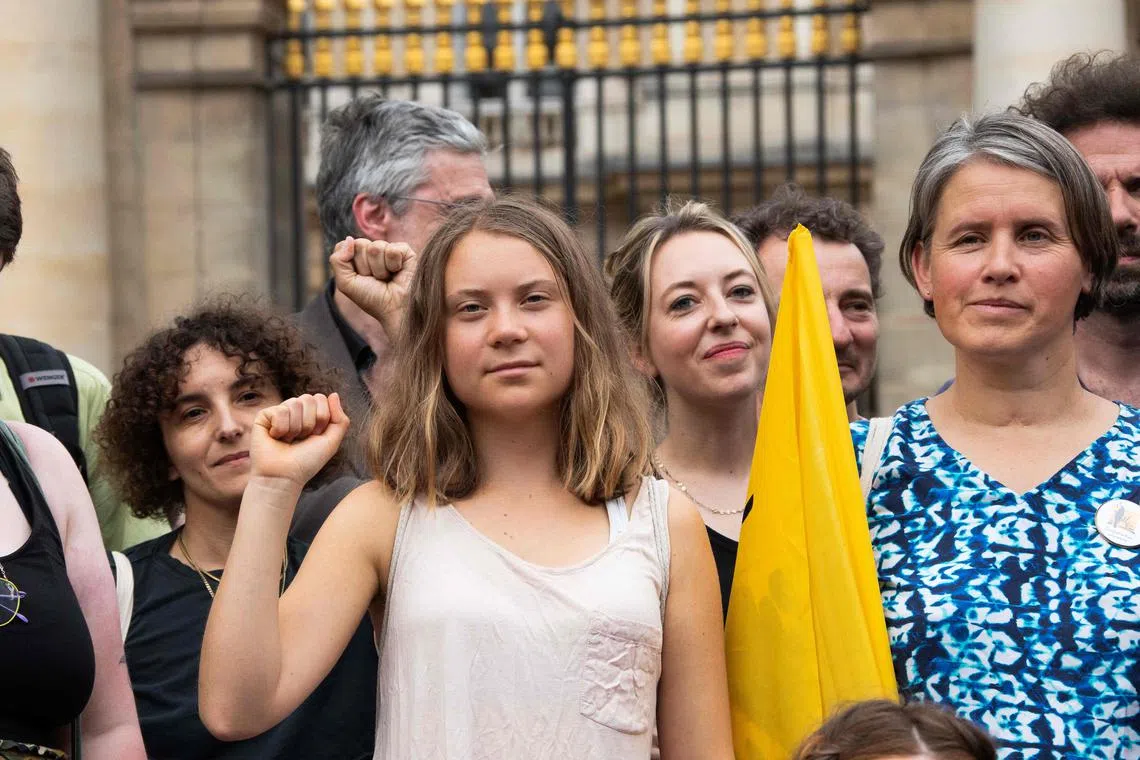Paris climate summit opens with call for ‘finance shock’
Sign up now: Get ST's newsletters delivered to your inbox

(From right) French President Emmanuel Macron, UN Secretary-General Antonio Guterres and Saudi Crown Prince Mohammed bin Salman at the Summit for a New Global Financial Pact in Paris on June 22.
PHOTO: AFP
PARIS - French President Emmanuel Macron told global leaders on Thursday that no country should have to choose between tackling poverty and dealing with climate change, during a summit tasked with reimagining the world’s financial system.
The Paris summit for a New Global Financial Pact is aimed at finding financial solutions to the interlinked global goals of tackling poverty, curbing planet-heating emissions and protecting nature.
In his opening remarks, Mr Macron told delegates that the world needs a “public finance shock” – a global push of innovation and financing – to fight these challenges, adding that the current system is not well suited to address the world’s challenges.
“Policymakers and countries shouldn’t ever have to choose between reducing poverty and protecting the planet,” he said.
Ugandan climate campaigner Vanessa Nakate took the podium after Mr Macron and asked the audience, which included oil-rich Saudi Arabia’s Crown Prince Mohammed bin Salman, to observe a minute of silence for people who are suffering from disasters.
She slammed the fossil fuel industry, saying it promises development for poor communities, but the energy goes elsewhere and the profits “lie in the pockets of those who are already extremely rich”.
“It seems there is plenty of money, so please do not tell us that we have to accept toxic air and barren fields and poisoned water so that we can have development,” she said.
French finance minister Bruno Le Maire has appealed to the rich world to provide more financial help to the poor countries facing the greatest threats from climate change.
Speaking on RFI radio ahead of the summit, Mr Le Maire said France will push delegates to consider the feasibility of new taxes on maritime transport, and how to improve debt restructuring and bolster the firepower of international institutions.
The minister said multilateral development banks could raise around US$200 billion (S$268 billion) to tackle climate change in the coming months by leveraging their balance sheets and taking more risk. He also said countries “can and will” meet their pledge to recycle US$100 billion of the International Monetary Fund’s (IMF) Special Drawing Rights to fund lending to poor countries.
“All together, we are looking at hundreds of billions of dollars,” Mr Le Maire said.
Economies have been battered by successive shocks in recent years, including Covid-19, Russia’s invasion of Ukraine, spiking inflation, debt and the spiralling cost of weather disasters intensified by global warming.
Leaders attending the summit include Kenyan President William Ruto, German Chancellor Olaf Scholz, Chinese Premier Li Qiang and European Commission head Ursula von der Leyen.
The international community must look at ways of introducing global carbon pricing to accelerate the transition to a lower-carbon economy, Ms von der Leyen told the summit on Thursday.
She also said that the world needed to expand the greenhouse gas emissions that are covered by a carbon price to support the energy transition, calling the current percentage of emissions covered by a price “almost nothing”.
United Nations Secretary-General Antonio Guterres will also attend the summit, as will US Treasury Secretary Janet Yellen, IMF managing director Kristalina Georgieva and World Bank chief Ajay Banga.
Dr Yellen said she and President Joe Biden believe it is critical to maintain communication to manage the United States’ relationship with China and to clear up misperceptions and miscalculations.
“We need to work together where possible, but we have disagreements, and we are also forthright in recognising where we do have disagreements,” she said at a press conference in Paris.
“I’m certainly pleased to see China participating in this summit,” she added. “I believe it’s important, as President Biden does, that the world’s two largest economies are united in working multilaterally and together in addressing global challenges.”
Climate campaigner Greta Thunberg will also be in the French capital, while singer Billie Eilish will perform at Global Citizen’s Power Our Planet concert on Thursday evening, lending star appeal to a macroeconomic niche unused to such a limelight.

Climate campaigner Greta Thunberg during a press conference in front of the Council of State in Paris on June 21.
PHOTO: AFP
Climate goals
France says the two-day summit will be a platform for ideas ahead of a cluster of major economic and climate meetings in the coming months.
But observers are looking for tangible progress – including keeping promises already made.
“We’d need to see some down payments from the richer countries and their development finance institutions,” said Mr Alex Scott of the think-tank E3G.
One likely announcement is that a 2009 pledge to deliver US$100 billion a year in climate finance to poorer nations by 2020
A second pledge to rechannel US$100 billion in unused “special drawing rights” – the IMF’s tool to boost liquidity
The summit comes amid growing recognition of the scale of the financial challenges ahead.
In 2022, a UN expert group said developing and emerging economies excluding China would need to spend around US$2.4 trillion a year on climate and development by 2030.
On Wednesday, the International Energy Agency (IEA) released a report
The IEA said investment must remain at those levels until the middle of the century to keep alive the Paris Agreement targets of limiting global warming to “well below” 2 deg C since pre-industrial times, and below 1.5 deg C if possible.
‘Great leap’
Countries are calling for multilateral development banks to help unlock climate investments and significantly increase lending, while stressing that new debt arrangements should include, as Barbados has, disaster clauses allowing a country to pause repayments for two years after an extreme weather event.
“If a cyclone comes, it doesn’t differentiate,” Samoa’s Fatumanava Pa’olelei Luteru, chair of the Alliance of Small Island States told AFP.
“It will set back your development for years,” he said, adding that countries should be given the fiscal space to recover.
Other ideas on the table include taxation on fossil fuel profits and financial transactions to raise climate funds.
The French presidency has said it wants to give “political impetus” to the idea of an international tax on carbon emissions from shipping, with hopes of a breakthrough at a meeting of the International Maritime Organisation in July.
Observers are also keenly awaiting details of a plan from South American countries to create a global structure for so-called debt-for-nature swops.
Ecuador announced the largest such transaction of its kind in May, aimed at directing vast resources to Galapagos Islands conservation.
After meetings in Germany last week, Colombia’s President Gustavo Petro said there had been discussions with the United States, Germany and African countries about the idea.
Mr Petro said it “could be humanity’s first great leap forward to address its biggest problem”.
AFP, BLOOMBERG


